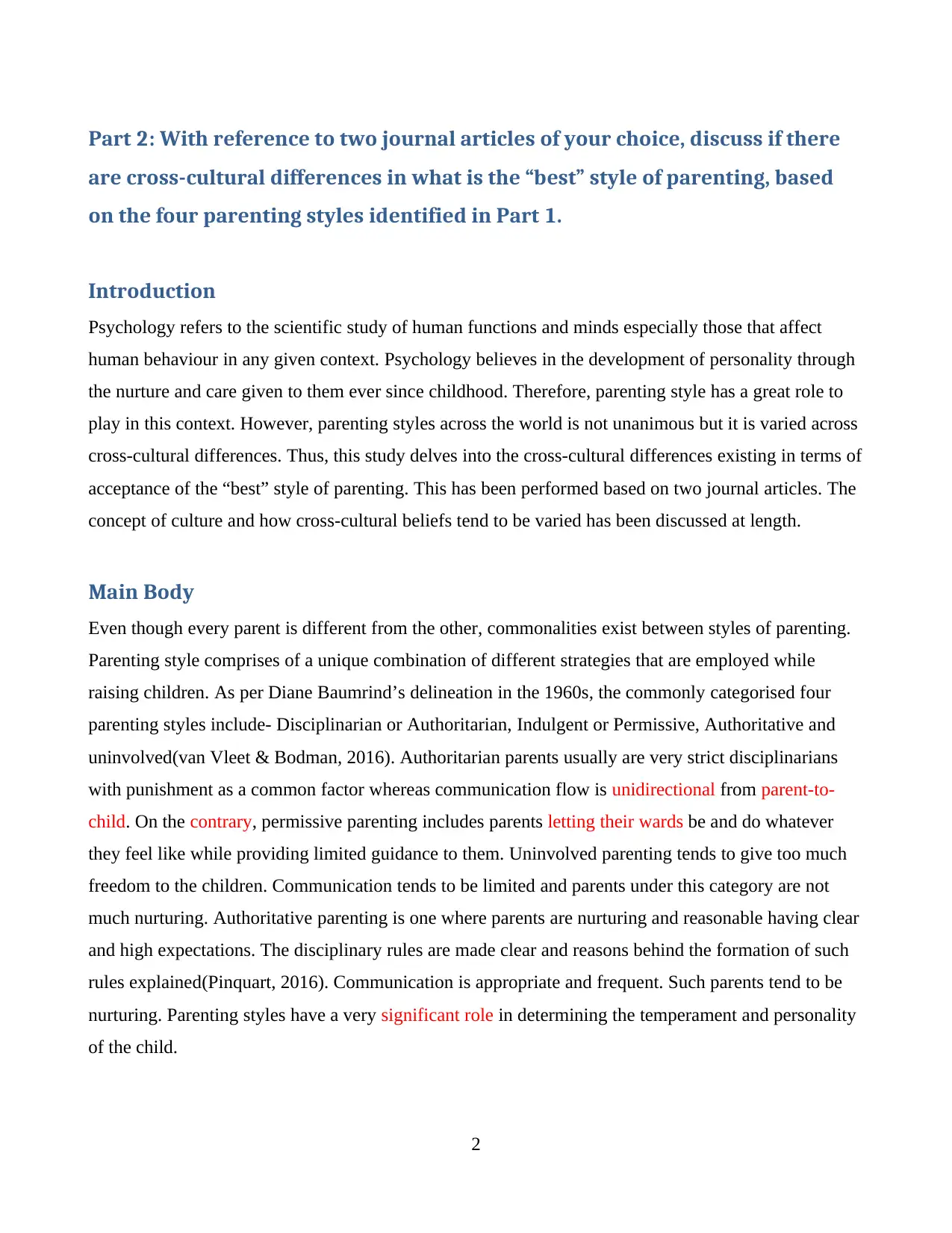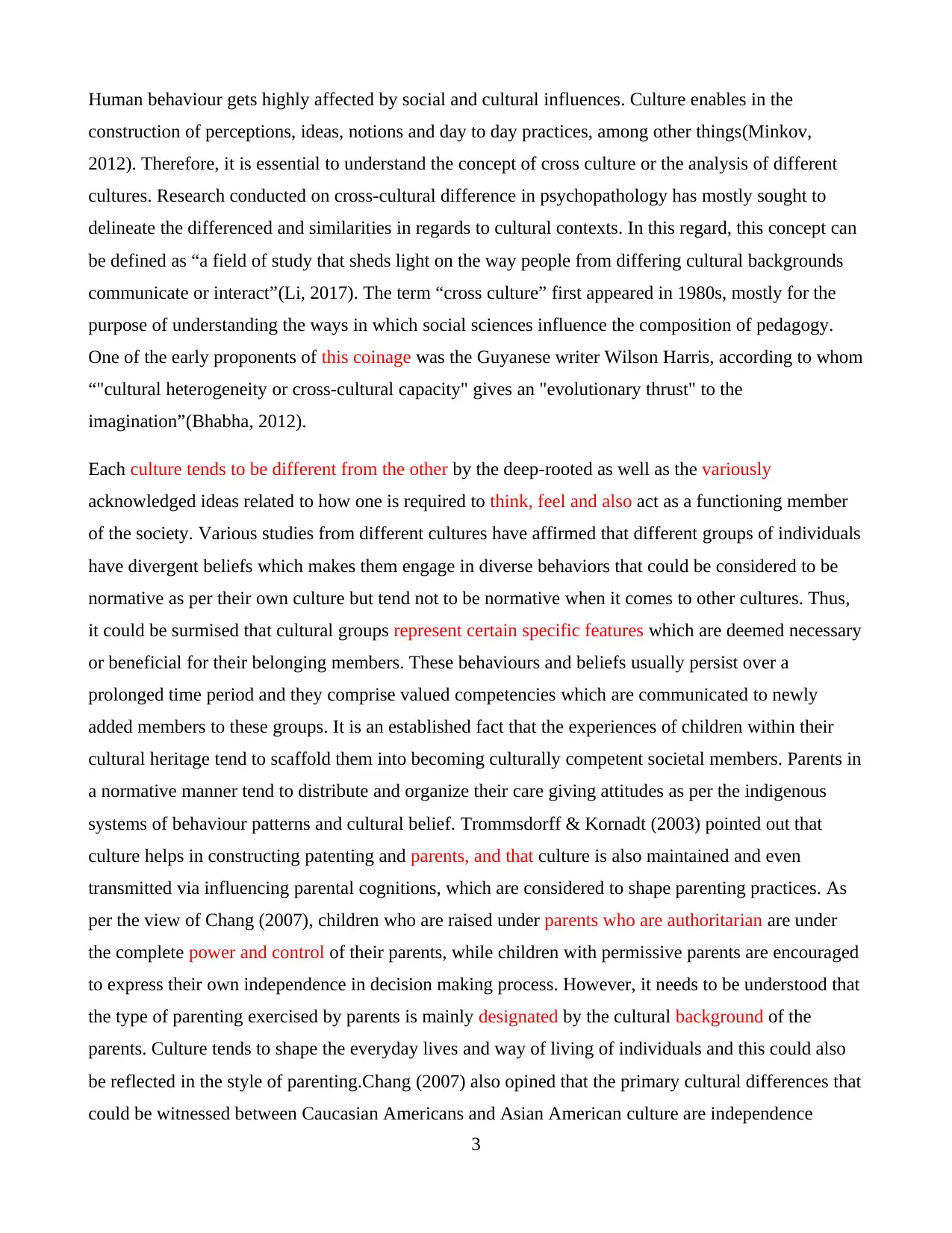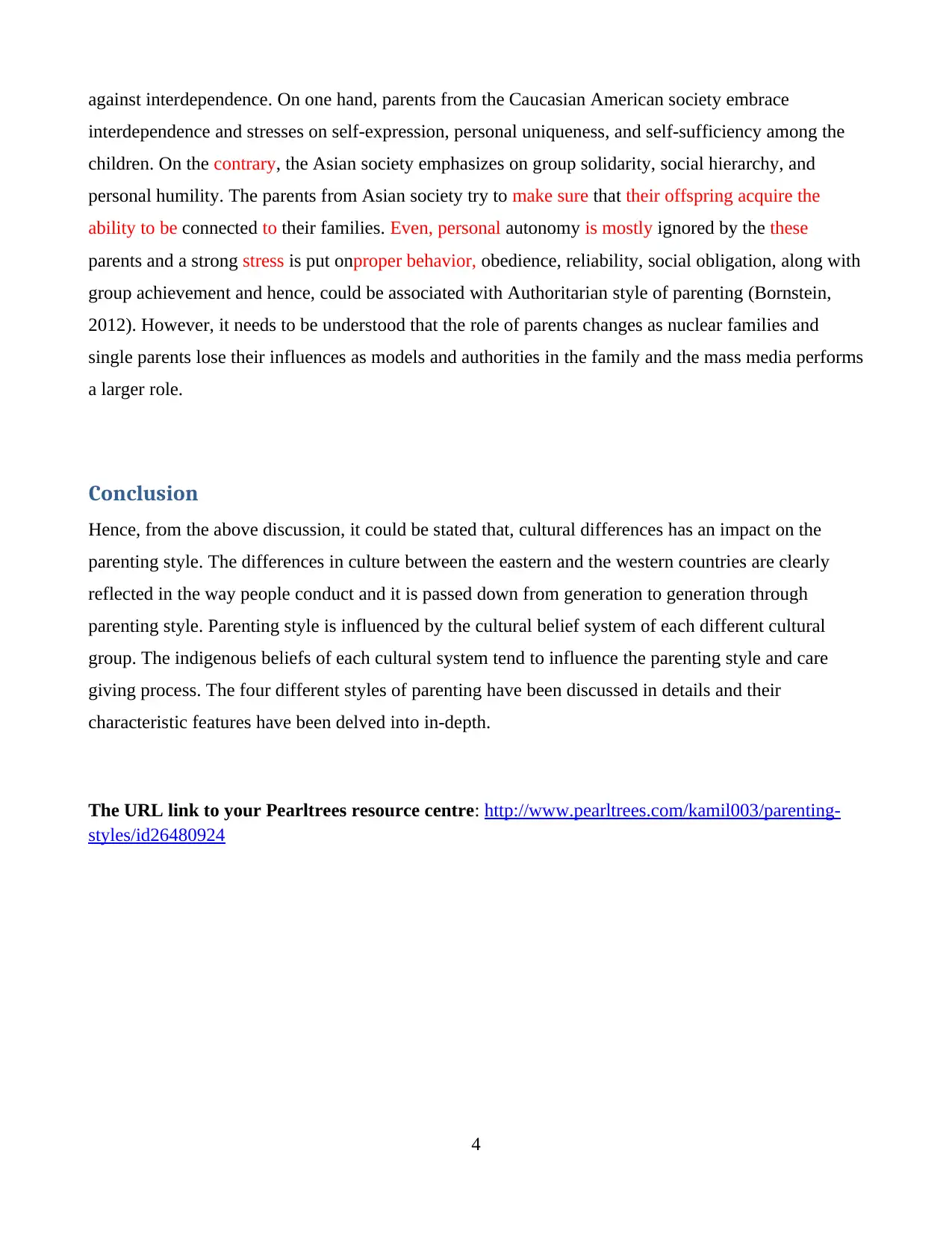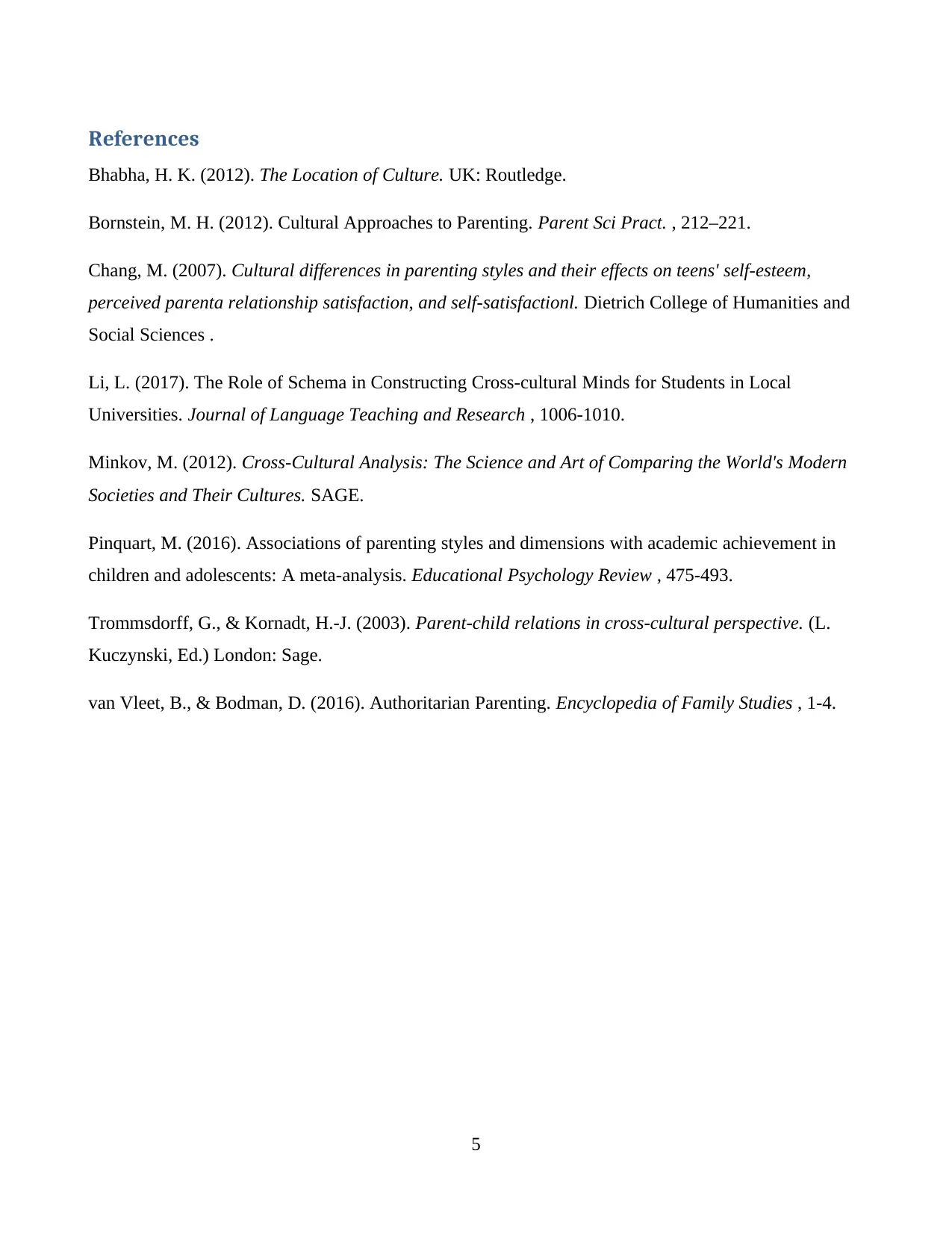PSY108 Introduction to Psychology TMA01: Cross-Cultural Parenting
VerifiedAdded on 2022/11/07
|5
|1407
|259
Essay
AI Summary
This essay, part of a Psychology TMA for PSY108, investigates cross-cultural differences in parenting styles, drawing upon two journal articles. It begins by defining psychology and the impact of parenting styles on child development, introducing the four parenting styles: authoritarian, permissive, uninvolved, and authoritative. The essay then explores the concept of culture and cross-cultural differences, emphasizing how cultural backgrounds shape perceptions and behaviors. It discusses the influence of culture on parenting practices, highlighting the differences between Western and Eastern societies, and the impact of media and societal changes on parental roles. The conclusion summarizes the impact of cultural differences on parenting styles, emphasizing the transmission of these styles across generations and the influence of cultural belief systems on caregiving practices. The essay also references a Pearltrees resource center for additional information.

Psychology
1
1
Paraphrase This Document
Need a fresh take? Get an instant paraphrase of this document with our AI Paraphraser

Part 2: With reference to two journal articles of your choice, discuss if there
are cross-cultural differences in what is the “best” style of parenting, based
on the four parenting styles identified in Part 1.
Introduction
Psychology refers to the scientific study of human functions and minds especially those that affect
human behaviour in any given context. Psychology believes in the development of personality through
the nurture and care given to them ever since childhood. Therefore, parenting style has a great role to
play in this context. However, parenting styles across the world is not unanimous but it is varied across
cross-cultural differences. Thus, this study delves into the cross-cultural differences existing in terms of
acceptance of the “best” style of parenting. This has been performed based on two journal articles. The
concept of culture and how cross-cultural beliefs tend to be varied has been discussed at length.
Main Body
Even though every parent is different from the other, commonalities exist between styles of parenting.
Parenting style comprises of a unique combination of different strategies that are employed while
raising children. As per Diane Baumrind’s delineation in the 1960s, the commonly categorised four
parenting styles include- Disciplinarian or Authoritarian, Indulgent or Permissive, Authoritative and
uninvolved(van Vleet & Bodman, 2016). Authoritarian parents usually are very strict disciplinarians
with punishment as a common factor whereas communication flow is unidirectional from parent-to-
child. On the contrary, permissive parenting includes parents letting their wards be and do whatever
they feel like while providing limited guidance to them. Uninvolved parenting tends to give too much
freedom to the children. Communication tends to be limited and parents under this category are not
much nurturing. Authoritative parenting is one where parents are nurturing and reasonable having clear
and high expectations. The disciplinary rules are made clear and reasons behind the formation of such
rules explained(Pinquart, 2016). Communication is appropriate and frequent. Such parents tend to be
nurturing. Parenting styles have a very significant role in determining the temperament and personality
of the child.
2
are cross-cultural differences in what is the “best” style of parenting, based
on the four parenting styles identified in Part 1.
Introduction
Psychology refers to the scientific study of human functions and minds especially those that affect
human behaviour in any given context. Psychology believes in the development of personality through
the nurture and care given to them ever since childhood. Therefore, parenting style has a great role to
play in this context. However, parenting styles across the world is not unanimous but it is varied across
cross-cultural differences. Thus, this study delves into the cross-cultural differences existing in terms of
acceptance of the “best” style of parenting. This has been performed based on two journal articles. The
concept of culture and how cross-cultural beliefs tend to be varied has been discussed at length.
Main Body
Even though every parent is different from the other, commonalities exist between styles of parenting.
Parenting style comprises of a unique combination of different strategies that are employed while
raising children. As per Diane Baumrind’s delineation in the 1960s, the commonly categorised four
parenting styles include- Disciplinarian or Authoritarian, Indulgent or Permissive, Authoritative and
uninvolved(van Vleet & Bodman, 2016). Authoritarian parents usually are very strict disciplinarians
with punishment as a common factor whereas communication flow is unidirectional from parent-to-
child. On the contrary, permissive parenting includes parents letting their wards be and do whatever
they feel like while providing limited guidance to them. Uninvolved parenting tends to give too much
freedom to the children. Communication tends to be limited and parents under this category are not
much nurturing. Authoritative parenting is one where parents are nurturing and reasonable having clear
and high expectations. The disciplinary rules are made clear and reasons behind the formation of such
rules explained(Pinquart, 2016). Communication is appropriate and frequent. Such parents tend to be
nurturing. Parenting styles have a very significant role in determining the temperament and personality
of the child.
2

Human behaviour gets highly affected by social and cultural influences. Culture enables in the
construction of perceptions, ideas, notions and day to day practices, among other things(Minkov,
2012). Therefore, it is essential to understand the concept of cross culture or the analysis of different
cultures. Research conducted on cross-cultural difference in psychopathology has mostly sought to
delineate the differenced and similarities in regards to cultural contexts. In this regard, this concept can
be defined as “a field of study that sheds light on the way people from differing cultural backgrounds
communicate or interact”(Li, 2017). The term “cross culture” first appeared in 1980s, mostly for the
purpose of understanding the ways in which social sciences influence the composition of pedagogy.
One of the early proponents of this coinage was the Guyanese writer Wilson Harris, according to whom
“"cultural heterogeneity or cross-cultural capacity" gives an "evolutionary thrust" to the
imagination”(Bhabha, 2012).
Each culture tends to be different from the other by the deep-rooted as well as the variously
acknowledged ideas related to how one is required to think, feel and also act as a functioning member
of the society. Various studies from different cultures have affirmed that different groups of individuals
have divergent beliefs which makes them engage in diverse behaviors that could be considered to be
normative as per their own culture but tend not to be normative when it comes to other cultures. Thus,
it could be surmised that cultural groups represent certain specific features which are deemed necessary
or beneficial for their belonging members. These behaviours and beliefs usually persist over a
prolonged time period and they comprise valued competencies which are communicated to newly
added members to these groups. It is an established fact that the experiences of children within their
cultural heritage tend to scaffold them into becoming culturally competent societal members. Parents in
a normative manner tend to distribute and organize their care giving attitudes as per the indigenous
systems of behaviour patterns and cultural belief. Trommsdorff & Kornadt (2003) pointed out that
culture helps in constructing patenting and parents, and that culture is also maintained and even
transmitted via influencing parental cognitions, which are considered to shape parenting practices. As
per the view of Chang (2007), children who are raised under parents who are authoritarian are under
the complete power and control of their parents, while children with permissive parents are encouraged
to express their own independence in decision making process. However, it needs to be understood that
the type of parenting exercised by parents is mainly designated by the cultural background of the
parents. Culture tends to shape the everyday lives and way of living of individuals and this could also
be reflected in the style of parenting.Chang (2007) also opined that the primary cultural differences that
could be witnessed between Caucasian Americans and Asian American culture are independence
3
construction of perceptions, ideas, notions and day to day practices, among other things(Minkov,
2012). Therefore, it is essential to understand the concept of cross culture or the analysis of different
cultures. Research conducted on cross-cultural difference in psychopathology has mostly sought to
delineate the differenced and similarities in regards to cultural contexts. In this regard, this concept can
be defined as “a field of study that sheds light on the way people from differing cultural backgrounds
communicate or interact”(Li, 2017). The term “cross culture” first appeared in 1980s, mostly for the
purpose of understanding the ways in which social sciences influence the composition of pedagogy.
One of the early proponents of this coinage was the Guyanese writer Wilson Harris, according to whom
“"cultural heterogeneity or cross-cultural capacity" gives an "evolutionary thrust" to the
imagination”(Bhabha, 2012).
Each culture tends to be different from the other by the deep-rooted as well as the variously
acknowledged ideas related to how one is required to think, feel and also act as a functioning member
of the society. Various studies from different cultures have affirmed that different groups of individuals
have divergent beliefs which makes them engage in diverse behaviors that could be considered to be
normative as per their own culture but tend not to be normative when it comes to other cultures. Thus,
it could be surmised that cultural groups represent certain specific features which are deemed necessary
or beneficial for their belonging members. These behaviours and beliefs usually persist over a
prolonged time period and they comprise valued competencies which are communicated to newly
added members to these groups. It is an established fact that the experiences of children within their
cultural heritage tend to scaffold them into becoming culturally competent societal members. Parents in
a normative manner tend to distribute and organize their care giving attitudes as per the indigenous
systems of behaviour patterns and cultural belief. Trommsdorff & Kornadt (2003) pointed out that
culture helps in constructing patenting and parents, and that culture is also maintained and even
transmitted via influencing parental cognitions, which are considered to shape parenting practices. As
per the view of Chang (2007), children who are raised under parents who are authoritarian are under
the complete power and control of their parents, while children with permissive parents are encouraged
to express their own independence in decision making process. However, it needs to be understood that
the type of parenting exercised by parents is mainly designated by the cultural background of the
parents. Culture tends to shape the everyday lives and way of living of individuals and this could also
be reflected in the style of parenting.Chang (2007) also opined that the primary cultural differences that
could be witnessed between Caucasian Americans and Asian American culture are independence
3
⊘ This is a preview!⊘
Do you want full access?
Subscribe today to unlock all pages.

Trusted by 1+ million students worldwide

against interdependence. On one hand, parents from the Caucasian American society embrace
interdependence and stresses on self-expression, personal uniqueness, and self-sufficiency among the
children. On the contrary, the Asian society emphasizes on group solidarity, social hierarchy, and
personal humility. The parents from Asian society try to make sure that their offspring acquire the
ability to be connected to their families. Even, personal autonomy is mostly ignored by the these
parents and a strong stress is put onproper behavior, obedience, reliability, social obligation, along with
group achievement and hence, could be associated with Authoritarian style of parenting (Bornstein,
2012). However, it needs to be understood that the role of parents changes as nuclear families and
single parents lose their influences as models and authorities in the family and the mass media performs
a larger role.
Conclusion
Hence, from the above discussion, it could be stated that, cultural differences has an impact on the
parenting style. The differences in culture between the eastern and the western countries are clearly
reflected in the way people conduct and it is passed down from generation to generation through
parenting style. Parenting style is influenced by the cultural belief system of each different cultural
group. The indigenous beliefs of each cultural system tend to influence the parenting style and care
giving process. The four different styles of parenting have been discussed in details and their
characteristic features have been delved into in-depth.
The URL link to your Pearltrees resource centre: http://www.pearltrees.com/kamil003/parenting-
styles/id26480924
4
interdependence and stresses on self-expression, personal uniqueness, and self-sufficiency among the
children. On the contrary, the Asian society emphasizes on group solidarity, social hierarchy, and
personal humility. The parents from Asian society try to make sure that their offspring acquire the
ability to be connected to their families. Even, personal autonomy is mostly ignored by the these
parents and a strong stress is put onproper behavior, obedience, reliability, social obligation, along with
group achievement and hence, could be associated with Authoritarian style of parenting (Bornstein,
2012). However, it needs to be understood that the role of parents changes as nuclear families and
single parents lose their influences as models and authorities in the family and the mass media performs
a larger role.
Conclusion
Hence, from the above discussion, it could be stated that, cultural differences has an impact on the
parenting style. The differences in culture between the eastern and the western countries are clearly
reflected in the way people conduct and it is passed down from generation to generation through
parenting style. Parenting style is influenced by the cultural belief system of each different cultural
group. The indigenous beliefs of each cultural system tend to influence the parenting style and care
giving process. The four different styles of parenting have been discussed in details and their
characteristic features have been delved into in-depth.
The URL link to your Pearltrees resource centre: http://www.pearltrees.com/kamil003/parenting-
styles/id26480924
4
Paraphrase This Document
Need a fresh take? Get an instant paraphrase of this document with our AI Paraphraser

References
Bhabha, H. K. (2012). The Location of Culture. UK: Routledge.
Bornstein, M. H. (2012). Cultural Approaches to Parenting. Parent Sci Pract. , 212–221.
Chang, M. (2007). Cultural differences in parenting styles and their effects on teens' self-esteem,
perceived parenta relationship satisfaction, and self-satisfactionl. Dietrich College of Humanities and
Social Sciences .
Li, L. (2017). The Role of Schema in Constructing Cross-cultural Minds for Students in Local
Universities. Journal of Language Teaching and Research , 1006-1010.
Minkov, M. (2012). Cross-Cultural Analysis: The Science and Art of Comparing the World's Modern
Societies and Their Cultures. SAGE.
Pinquart, M. (2016). Associations of parenting styles and dimensions with academic achievement in
children and adolescents: A meta-analysis. Educational Psychology Review , 475-493.
Trommsdorff, G., & Kornadt, H.-J. (2003). Parent-child relations in cross-cultural perspective. (L.
Kuczynski, Ed.) London: Sage.
van Vleet, B., & Bodman, D. (2016). Authoritarian Parenting. Encyclopedia of Family Studies , 1-4.
5
Bhabha, H. K. (2012). The Location of Culture. UK: Routledge.
Bornstein, M. H. (2012). Cultural Approaches to Parenting. Parent Sci Pract. , 212–221.
Chang, M. (2007). Cultural differences in parenting styles and their effects on teens' self-esteem,
perceived parenta relationship satisfaction, and self-satisfactionl. Dietrich College of Humanities and
Social Sciences .
Li, L. (2017). The Role of Schema in Constructing Cross-cultural Minds for Students in Local
Universities. Journal of Language Teaching and Research , 1006-1010.
Minkov, M. (2012). Cross-Cultural Analysis: The Science and Art of Comparing the World's Modern
Societies and Their Cultures. SAGE.
Pinquart, M. (2016). Associations of parenting styles and dimensions with academic achievement in
children and adolescents: A meta-analysis. Educational Psychology Review , 475-493.
Trommsdorff, G., & Kornadt, H.-J. (2003). Parent-child relations in cross-cultural perspective. (L.
Kuczynski, Ed.) London: Sage.
van Vleet, B., & Bodman, D. (2016). Authoritarian Parenting. Encyclopedia of Family Studies , 1-4.
5
1 out of 5
Related Documents
Your All-in-One AI-Powered Toolkit for Academic Success.
+13062052269
info@desklib.com
Available 24*7 on WhatsApp / Email
![[object Object]](/_next/static/media/star-bottom.7253800d.svg)
Unlock your academic potential
Copyright © 2020–2026 A2Z Services. All Rights Reserved. Developed and managed by ZUCOL.





